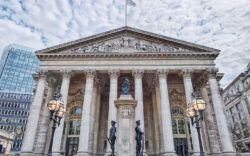Important note: One of my most trusted sources over at The Fleet Street Letter has handed me a document – and it reveals details of something that could threaten your wealth. I’m calling it a “secret tax” – but what is it and what can you do about it? Click here to find out more and how you could protect yourself.
In today’s issue:
- Whose fault was the September 2022 bond market meltdown?
- Do you check for gunpowder when you light a match?
- The dangerous consequences of blaming tax cuts
If a piece of straw breaks a camel’s back, whom do you blame?
It sounds like some sort of riddle. Or an investment bank job interview question. But the answer might be rather important to the UK’s future.
Because, two years ago, we got it wrong. And our country began to go off track as a result…
In September 2022, Liz Truss came to power and announced her mini-budget. The bond market went into meltdown over the unfunded tax cuts. (An unfunded tax cut is one that is not met with corresponding amounts of spending cuts.)
The crash in bonds got so bad that the Bank of England had to rescue the government by buying its bonds. The Chancellor resigned, but it wasn’t enough. Liz Truss had to go too. And her tax-cutting pro-growth policies with her.
The question is why?
At the time, it seemed so simple. The tax cuts had blown out budget deficit projections. All that additional borrowing meant interest rates would go up. And so lenders to the government had sold their bonds.
Liz Truss clearly wasn’t capable of running the government’s finances. Confidence in the government had to be restored.
A clear-cut case of financial mismanagement?
It soon became clear that some of the bond market panic was caused by liability-driven investments (LDIs). Pension funds had used derivatives to match the timing of their incomes to the timing of their payouts to pensioners.
This seemed like prudent policy. But the flaws remind me of collateralised debt obligations (CDOs) and value at risk (VaR) in 2008. It’s not worth opening those cans of worms. Except to say that risk managers didn’t model the impact of extreme scenarios to discover what’d happen to their portfolios.
Nobody thought it was possible for the entire US housing market to experience falling prices. In a congressional hearing, the chairman of the Federal Reserve flat out failed to entertain the question of what would happen. Because it had never happened before, he said.
Nobody had considered what’d happen to LDIs should bond prices crash. But in 2022, they did.
In both cases it turned out that financial engineering had created the equivalent of picking up pennies in front of a steamroller while assuming the steam roller doesn’t exist. It looks like a great idea, on paper. Until the steam roller appeared.
The LDI debacle created an alternative explanation for what happened in September 2022. Perhaps the bond market crash wasn’t the government’s fault after all. It had only added one straw to the camel’s back.
Whose fault was it then?
The Financial Times is the latest newspaper to cover research from the Bank of England which helps us apportion the blame:
The scores on the doors over the 16-day ‘crisis period’, based on their analysis:
— Bond yield spike due to “bond vigilantes”, AKA the gilt market doing gilt market stuff = 37bps
— Bond yield spike attributed to pension funds getting margin called because of market losses from the bond spike due to Truss/Kwarteng unfunded tax cuts, AKA doom looping = 66bps
In other words, Liz Truss can only be blamed for a third of the bond market crash. The pension fund’s risk managers for two thirds.
But that’s very misleading. Because we’re talking about causation and temporal relation here.
The mini budget was the straw that broke the camel’s back. If Liz Truss’ mini-budget sparked the pension fund chaos, isn’t she still to blame?
A painfully philosophical question
Last time I checked, prudential regulation is the Bank of England’s job. They’re responsible for managing the sort of risks that blew up the bond market in September 2022.
Indeed, it has been the Bank which got busy dealing with the LDI problem since 2022. It has created new rules and backstops.
You could argue the people whose job it is to manage risk in the financial system are responsible for preventing overloaded camels. We rely on them to do it properly. They didn’t.
But I’ll admit that’s just another way of looking at it. Here’s the metaphor the Financial Times uses to assign responsibility:
Striking a match is not in and of itself stupid. But striking a match without checking whether you’re surrounded by kegs of gunpowder is.
Similarly, announcing a growth plan involving deficit spending isn’t in itself irresponsible, but announcing it at a moment when collateral levels among leveraged gilt investors is wafer-thin means the likely market spook risks triggering a major run.
And, as we wrote three months ahead of the mini-Budget, the gilt market was particularly vulnerable to an industry-wide margin call around the time Kwarteng stood at the dispatch box. As a result, we argued (back in November 2022) that ignorance of gilt market structure rather than fiscal profligacy was what really brought down Truss/Kwarteng.
Did you check for gunpowder the last time you struck a match?
Perhaps it’s fair to say Liz Truss should’ve known about collateral levels amongst leverage gilt investors. Perhaps not.
But who put all that gunpowder under the bond market in the first place? Find out here.
Bond markets had crashed all year – long before Liz Truss showed up in Downing Street. In fact, on a bond yield chart the budget blowout is barely a blip in a long trend.
But who put all that gunpowder under the bond market in the first place? Find out here.
You could say their decision to raise rates by half a percent and announce £80 billion in bond sales the day before a budget was lighting the fuse. Liz Truss just happened to walk into the room when the gunpowder blew up.
Look, I don’t know how to fairly apportion blame for the September 2022 fiasco. It seems to be a philosophical question like the one we started with. Whom would you blame for the straw that breaks the camel’s back? You could argue around in circles about it forever.
But I do know the consequences of our decision to blame Liz Truss are immense. It put the country’s politics and economy on a completely different course.
One I predict will be disastrous for your money, as taxpayers are going to discover in a few weeks’ time…
Until next time,

Nick Hubble
Editor, Fortune & Freedom



